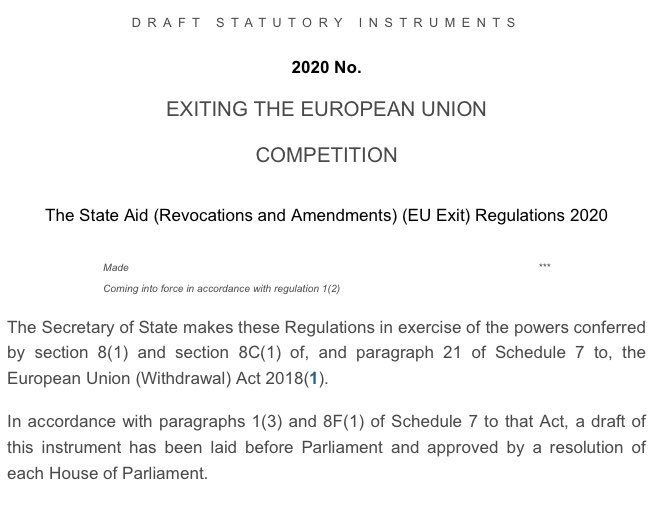
What happens in the absence of State aid rules?
A couple of US examples provide some insight.
Firstly subsidy races. Each year the US public sector spends c.$100 bn persuading businesses to relocate within the US. No real benefit for US economy.
theatlantic.com/ideas/archive/…
•1•
A couple of US examples provide some insight.
Firstly subsidy races. Each year the US public sector spends c.$100 bn persuading businesses to relocate within the US. No real benefit for US economy.
theatlantic.com/ideas/archive/…
•1•
Subsidy auctions are competitions organised by big companies to play off funding bodies and generate the biggest taxpayer funded subsidy.
State aid rules act as a backstop for the public sector to collectively refuse to go beyond set values. Bids win on merit, not money.
•2•
State aid rules act as a backstop for the public sector to collectively refuse to go beyond set values. Bids win on merit, not money.
•2•
In 2017 Amazon launched a subsidy auction in the US for a ‘second’ headquarters.
With weak subsidy control rules over 238 cities bid against each other.
Taxpayer subsidies spiralled upwards. State aid rules would have safeguarded the taxpayer.
•3•
marketwatch.com/story/what-ama…
With weak subsidy control rules over 238 cities bid against each other.
Taxpayer subsidies spiralled upwards. State aid rules would have safeguarded the taxpayer.
•3•
marketwatch.com/story/what-ama…
State aid rules also work as a sense check on the largest subsidies.
The regulator review process ensures that funding offered isn’t excessive or wasteful. It also checks appropriate legal conditions are in place to ensure public funding achieves the outcomes promised.
•4•
The regulator review process ensures that funding offered isn’t excessive or wasteful. It also checks appropriate legal conditions are in place to ensure public funding achieves the outcomes promised.
•4•
Which brings us to #DonaldTrump and the $3bn subsidy to #Foxconn, for their Wisconsin plant, which surely would have benefited from a regulator providing a sense check?
•5•
•5•

State aid rules work to control and coordinate subsidies.
In the Foxconn example the rules would have surely linked subsidies to actual investment.
Instead, the State has provided the subsidy and the plans have been changed, for the worse.
•6•
In the Foxconn example the rules would have surely linked subsidies to actual investment.
Instead, the State has provided the subsidy and the plans have been changed, for the worse.
•6•
The manufacturing plant is now a storage facility.
It’s reported to be 1/20th of the size and employ around 1/6th of the staff originally envisaged.
The lack of a subsidy framework meant taxpayer money was wasted.
theregister.com/2020/10/20/wic…
•7•
It’s reported to be 1/20th of the size and employ around 1/6th of the staff originally envisaged.
The lack of a subsidy framework meant taxpayer money was wasted.
theregister.com/2020/10/20/wic…
•7•

If you think that couldn’t happen here in the UK, think again.
The Government’s current “no deal” plan for subsidies is weaker than the US.
WTO subsidy rules were never designed to be a domestic subsidy regime. They won’t work as a replacement.
gov.uk/government/new…
•8•
The Government’s current “no deal” plan for subsidies is weaker than the US.
WTO subsidy rules were never designed to be a domestic subsidy regime. They won’t work as a replacement.
gov.uk/government/new…
•8•
Which is why almost everyone with experience of working with subsidies recognises rules are needed.
These could be UK State aid rules, which ensure subsidies still get to our economic priorities.
But whatever you think, I’m sure you agree that time is running out.
•End•
These could be UK State aid rules, which ensure subsidies still get to our economic priorities.
But whatever you think, I’m sure you agree that time is running out.
•End•

• • •
Missing some Tweet in this thread? You can try to
force a refresh










